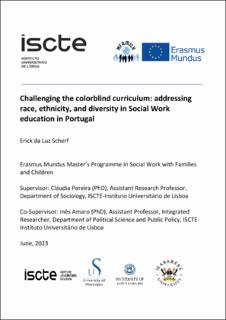| dc.description.abstract | Social Work education must prepare students for culturally relevant practice, which includes teaching about race and ethnic diversity. To address racism and discrimination effectively in social work practice, social workers need tools to recognize and overcome their own biases while providing better interventions for diverse populations. Therefore, this research aims to evaluate how race, ethnicity, and diversity are addressed in the social work curriculum in Portugal. Given Portugal's history of lusotropicalism and colorblind attitudes, actively challenging systemic racism and discrimination is crucial not only for society but also for social work education. A colorblind curriculum could perpetuate normative discourses and systemic oppression. This investigation examines how the curriculum reflects the experiences of diverse populations, considering factors such as race, ethnicity, social class, gender, and sexual orientation, among other things. The study analyzes Study Plans and Curricular Units, surveys Social Work Faculty, and conducts interviews across different Higher Education Institutions. The research employs document and content analysis, an online survey, and semi-structured interviews. The focus is on Bachelor of Social Work programs, as this degree is required to practice the profession in Portugal. The work draws on theoretical frameworks such as Intersectionality, Critical Race Theory, and Anti-racist Education/Pedagogy. The findings indicate that most Portuguese BSW programs cover the proposed topics and competencies, albeit with a stronger emphasis on socio-cultural diversity rather than ethnoracial issues. However, there is room for improvement to ensure a more robust and consistent approach to diversity and discrimination in social work education, equipping students to navigate and transform an unequal and racialized society. | en_US |

